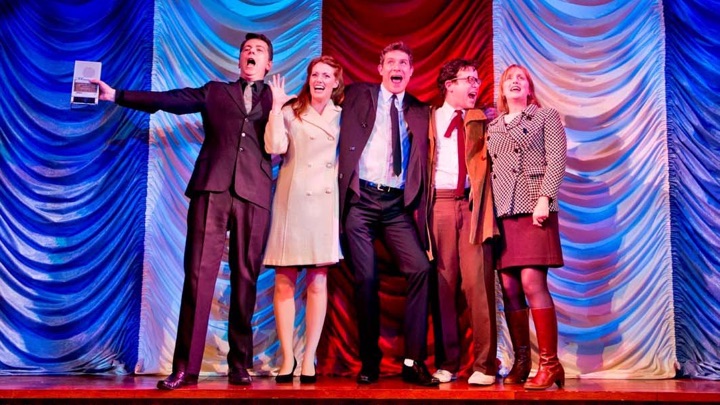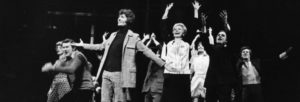
“Merrily We Roll Along,” London, 2013.
In 1982, my parents took me to the European premiere of Merrily We Roll Along at the Guildhall School of Music and Drama, because they apparently didn’t know what happens if you get your nine-year-old hooked on musical theatre. I can’t say I remember much about the show—it’s possible that its examination of compromise and regret isn’t intended to land that hard with the pre-pubescent—but I obviously enjoyed it enough for my parents to get hold of the Original Broadway Cast Recording that Christmas.
This wasn’t easy to do in London in the 80s. The show had flopped on Broadway and the OCR not released in the UK, so you needed to Know People Who Knew People and I suspect my parents, great lovers of musical theatre, were using my present as a figleaf to get the show into the house.
Whatever the reason, that disc stayed on my turntable non-stop for a good year, until I knew every word and every note backwards, appropriately enough for Merrily. Again, I didn’t understand everything, but the tough-love cynicism of “Now You Know,” the angry, embarrassing bravura of “Franklin Shephard, Inc.” the heartbreak of “Not A Day Goes By” and, above all, the aching optimism of “Our Time” were all universal enough to land, and although I wasn’t really much of an expert on alcoholism or divorce I was intrigued by the idea that, in this back to front story, all these adults were cross and sad at the beginning, and excited and happy at the end.
From then on, Sondheim was on my likes list, but it wasn’t an instant capitulation. I saw the London revival cast of Follies when I was 14, and although the cast recording of that also had fairly heavy rotation, it didn’t get quite to Merrily levels. I had found a vinyl copy of Side by Side by Sondheim at a second-hand record shop, and I had a studio-only recording of A Little Night Music, which brought Janis Kelly, Bonaventura Bottone, Siân Phillips and Elisabeth Welch together for what I am pretty sure was the only time. By the time I left home for university in 1991, Sondheim was someone I knew of, and liked, but whose work wasn’t as important to me as it was very soon about to become.
In order to understand the next bit of the journey, you need to know how insufferable I was when I was 18. “How insufferable were you?” you ask, and I tell you that in my first student room I slept with the Marschallin’s opening words to the Rosenkavalier trio next to my bed (in, naturally, German, a language I barely speak) because I thought they were the most profound thing ever and would make me come across as wise and worldly. What they in fact did was made me someone who’d written down a bit of a German opera and bafflingly put it on the wall, but hindsight, die ist ein sonderbar ding.It’s not as if I was in any way able to relate to the Marschallin’s noble renunciation of love, either. At 18, I had had precisely two relationships, both with women, and I had ended them both (these facts were, as I was later to fully realise, related). But Sondheim loomed large in the first hard love lesson I was to learn.
I auditioned for a new musical in my first term at university, and I sang “Too Many Mornings” at the audition, because of course I did. I can’t remember how I sneaked a glance at the director’s notes, but I remember that they said “fucking brilliant voice” and, kids, when you see someone has written something like that about you, it’s not hugely surprising if you end up with a massive crush on them. After a late rehearsal one night, the director and I ended up in my college room, I acquiesced and the rest is a blank.
Being a relatively innocent 18 year old, I assumed that having slept together, we were now Very Much In Love and it was probably the biggest shock of my life to that point when I realised, slowly slowly, that our first night had also been our last. I cried, I wrote terrible poetry, I cried some more… and I listened to Julia Mckenzie on that Follies recording, singing “Losing My Mind,” over and over again, using the finest cassette rewind technology the early 90s had to offer for hours on end, and trying to ignore that he had never said he loved me, not even just to be kind.
It’s no exaggeration to say that over the following years, Sondheim’s work gave me a crash course in adult relationships that was infinitely more useful than the actual relationships I got involved in. As I explored the back catalogue, his songs taught me a far more nuanced and sophisticated version of what happens between human beings than the primary-coloured glow I put on my various fumblings ever could.“I need you more than I can say/ I need you more than just today/ I guess I need you more than you need me, and yet I’m happy” “All the stings, the ugly things we’ll leave unsaid/ We’ll build a cocoon of love and respect/ You promise whatever you like, I’ll never collect” “Loving you is not a choice, and not much reason to rejoice” “The kind of love that she couldn’t make fun of/ She’d have/ None of” “What’s as intriguing, or half so fatiguing, as what’s out of reach?” “But you pine away with an idiotic grin.”” Lots, as they say, to unpack.
As someone navigating the dangerous mixture of endless horniness, emotional incontinence and internalised shame that characterised the early adulthood of so many queer Gen Xers, the mixture of romance and realism in Sondheim songs, the revelation that while love could be grand and passionate it could also be mundane or inconvenient or mistimed or just plain embarrassing, was such a relief.
And it was also when I was a student that I first got to experience a Sondheim show from the inside. When I was 20 my ex directed Sweeney Todd (I say “ex’—he actually dumped me the day before auditions, because love’s disgusting, love’s insane, a humiliating business) and cast me as Anthony. This is where words begin to fail me. I couldn’t express the sheer euphoria of actually getting to sing “Johanna” or “Kiss Me/Sensitivities” if I tried.
I’ve never understood the canard that Sondheim’s work is cold or over-intellectual—sit in an audience sobbing its way through Follies or Company then tell me that again—and when you perform one of his romantic songs everything is done for you. You don’t need to emote your way through it, you don’t need to graft anything on top of what is already there. You ride the wave. Think of some of the most purely emotional moments in Sondheim songs. Think of “Not going left, not going right” or “Who out there could love you more than I?” or “And no, not a day goes by” or “I’ll always be there, as frightened as you?” and it becomes clear that the lyrics do their job with a devastating simplicity, and the ache is right there in the melody.
By the time I graduated, I’d added another Sondheim part to the list. Another ex cast me as Senex in Forum, which I think you’ll agree is a truly impressive piece of shade, and which finally taught me the valuable lesson to stop sleeping with directors. I’d also missed an amazing opportunity to live on another timeline: I was offered a season with the National Youth Music Theatre, a company I’d worked with as a kid, but because I was a Big Grown Up Student of 19 I rejected the opportunity. That was, inevitably, the NYMT show that ended up transferring to Broadway, and guess who the cast were introduced to on the first night? No, I’m not over it, and no, I won’t ever be. Losing my timing this early in my career.
Sondheim’s songs, like all the best art, catch the light differently depending on who holds them up, and when. My mother, blissfully married since the age of 21, always insisted “Being Alive” was a joyous and an uplifting song; when I was terminally single I thought it was the saddest song ever written (it is of course both). I’ve heard “Loving You” sung in concert, shorn of its subtext of obsession, where it reads as the epitome of romance. “Not A Day Goes By” is used in Merrily twice—as an outpouring of love on Frank and Beth’s wedding day, and as a howl of misery on the day they divorce.
If Sondheim had written solely on the subject of love and relationships, his immortality would have been more than secured. But now think of Assassins or Sunday in the Park with George. Many of the greatest musicals ever written don’t aim much higher than “boy meets girl, there is jeopardy, boy gets girl’. Here we get instead “boy is alienated by national mythology to the point of political murder” or “boy grapples with the artist’s struggle between the joy and the solitude of creation.”
Just as King Lear is a play about everything, in Sondheim’s catalogue there are few aspects of the human condition you won’t find examined (and nailed) somewhere. And if that weren’t enough, few songwriters have ever been funnier. (“Coercinabull” “No, I’d strike her first” “That’ll show him”).
Not everything worked, of course. Anyone Can Whistle contains some of Sondheim’s greatest songs but has never truly landed in a staged production. Pacific Overtures has never quite won audiences over, and would require a lot of hard decisions to be made by anyone wanting to stage it in 2021. Bounce/Road Show went through several iterations while never finding its feet. But even there, we have “With So Little To Be Sure Of” and “Someone In A Tree” and “Isn’t He Something?’. Even when it’s not the greatest, it’s so so good.Performers love Sondheim, and his work loved them back. We love him because he understands us: the Sondheim song most guaranteed to make an arts freelancer cry is “Move On.”The list of iconic performances given in his work stretches from Zero Mostel’s Pseudolus through Dean Jones, Adrian Lester, Raul Esparza and Rosalie Craig as Bobby, to Bernadette Peters” two crowning performances in the back-to-back masterpieces of his middle age.
Along the way you’ll also find unforgettable work by artists as varied as Elaine Stritch, Angela Lansbury, Regina Resnik, Carol Burnett, Diana Rigg, Eartha Kitt, Barbara Cook, Mandy Patinkin, Jenna Russell, Judi Dench, Alexis Smith, Meryl Streep, Madonna and Licia Albanese. I’m physically having to stop myself continuing this list because it could go on for ever, and that’s before I even mention that one song of his which has been sung by Frank Sinatra, Renata Scotto, Bing Crosby, Sumi Jo, Sarah Vaughan, Evelyn Lear, Count Basie, Krusty The Klown… It’s a wonderfully Sondheimy irony that his most commercially successful song is the one he wrote to cope with the tiny range and limited breath control of its original performer.
The last time I saw a Sondheim show on stage while we shared the same planet was Follies in 2017, to which I took two MT-sceptic friends of mine whose eyes glistened with tears throughout. The last time I performed in one was as a Liebeslieder in A Little Night Music in 2018, where night after night I experienced something I fervently wish for every music lover: being part of the exhilarating runaway train that is “A Weekend In the Country”.” From my early childhood to my late-early-middle-whateverhood, Sondheim’s work with its sly, compassionate wisdom and brave, bruised heart has been a constant and essential companion.It’s heartbreaking that we’ve lost him, and so wonderful that we had him. He’s given us a pattern for understanding loss, too, naturally: “We disappoint, we disappear, we die but we don’t” was a line I’d sung along with casually for years until it suddenly ran me over a year or so after my father died. Sondheim’s contribution to the history of American Music Theatre is unquestioned and eternal. But the legacy of his work is more individual than that, more personal; the first time one of his insights strikes you is a deeply private moment of communication between writer and listener—”he gets me!”
My dad was a writer, and in one of his last published poems, he told my mother not to visit his grave, but instead to “look into my living imagination”—to keep him alive and present by engaging with his work. How lucky we are that Sondheim’s living imagination, in all its complexity, remains available to us. It was marvellous to know you, Mr Sondheim, and it’s never really through.


